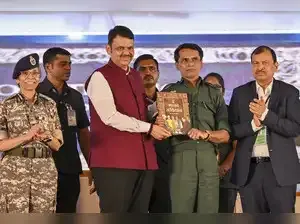A quiet understanding between Maharashtra Chief Minister Devendra Fadnavis and senior Maoist ideologue Bhupathi set the stage for last week’s unprecedented mass surrender of People’s Liberation Guerrilla Army (PLGA) members, top government sources revealed to TOI.
According to the report, Fadnavis instructed a temporary slowdown of anti-Maoist operations in the dense forests of Abujmarh — the insurgent stronghold — after receiving covert surrender signals from Bhupathi.
In discreet communications that stretched over two months, Fadnavis reportedly assured Bhupathi of protection, rehabilitation through government welfare schemes, and amnesty under the Unlawful Activities (Prevention) Act (UAPA) and other charges.
The process gained momentum when Bhupathi’s wife, Tarakka — herself a prominent Maoist commander — laid down arms in January.
Her decision, sources told the news outlet, emboldened Bhupathi to take the final step. The understanding with Fadnavis soon opened a path for PLGA cadres hiding across Maharashtra and Chhattisgarh to come out of the forests and surrender.
TOI further reported that in one of the most striking scenes of reconciliation, members of Chhattisgarh’s Rohi Dalam crossed into Gadchiroli to give up arms.
On October 14, Bhupathi’s fears of post-surrender reprisals were allayed when a unit of Maharashtra’s elite C-60 commandos arrived unarmed at Fodewada village, at the base of Abujmarh, to welcome the guerrillas. The team then escorted them in a fortified bus to the Gadchiroli police headquarters. Officials called the gesture “tactical but unprecedented.”
During backchannel talks, Bhupathi is said to have promised to persuade around 500 weary tribal fighters to return to the mainstream. Fadnavis reciprocated by quietly pausing combing operations under the pretext of a monsoon break while negotiators finalized surrender logistics.
While Chhattisgarh’s forces maintained pressure in their sector, Maharashtra adopted a wait-and-watch approach — a move that allowed Bhupathi to align with Fadnavis’s vision of a peaceful resolution in the Dandakaranya and Abujmarh belt. Over the following weeks, Bhupathi emerged from hiding, reaching out to ground-level cadres and urging them to give up arms. By mid-October, around 350 Maoists had surrendered, with another 150–200 expected to follow suit.
The culmination came on October 15, during the official surrender ceremony at Gadchiroli police headquarters. Bhupathi had reportedly requested that Fadnavis personally attend, to which the CM readily agreed. “I would have gone to the jungles to bring Bhupathi out...,” Fadnavis told reporters after the event.
According to a senior official cited by TOI in their report, the mass surrender may have averted a humanitarian crisis: "These disenchanted tribals were fleeing on empty stomachs, ailing and injured, as their aggressive commanders, including Hidma and Devji, were urging them to fight to the last bullet. Bhupathi's bold move saved hundreds of tribal lives."
According to the report, Fadnavis instructed a temporary slowdown of anti-Maoist operations in the dense forests of Abujmarh — the insurgent stronghold — after receiving covert surrender signals from Bhupathi.
In discreet communications that stretched over two months, Fadnavis reportedly assured Bhupathi of protection, rehabilitation through government welfare schemes, and amnesty under the Unlawful Activities (Prevention) Act (UAPA) and other charges.
Turning point after wife’s surrender
The process gained momentum when Bhupathi’s wife, Tarakka — herself a prominent Maoist commander — laid down arms in January.
Her decision, sources told the news outlet, emboldened Bhupathi to take the final step. The understanding with Fadnavis soon opened a path for PLGA cadres hiding across Maharashtra and Chhattisgarh to come out of the forests and surrender.
TOI further reported that in one of the most striking scenes of reconciliation, members of Chhattisgarh’s Rohi Dalam crossed into Gadchiroli to give up arms.
On October 14, Bhupathi’s fears of post-surrender reprisals were allayed when a unit of Maharashtra’s elite C-60 commandos arrived unarmed at Fodewada village, at the base of Abujmarh, to welcome the guerrillas. The team then escorted them in a fortified bus to the Gadchiroli police headquarters. Officials called the gesture “tactical but unprecedented.”
‘I would have gone to the jungles to bring him out’
During backchannel talks, Bhupathi is said to have promised to persuade around 500 weary tribal fighters to return to the mainstream. Fadnavis reciprocated by quietly pausing combing operations under the pretext of a monsoon break while negotiators finalized surrender logistics.
While Chhattisgarh’s forces maintained pressure in their sector, Maharashtra adopted a wait-and-watch approach — a move that allowed Bhupathi to align with Fadnavis’s vision of a peaceful resolution in the Dandakaranya and Abujmarh belt. Over the following weeks, Bhupathi emerged from hiding, reaching out to ground-level cadres and urging them to give up arms. By mid-October, around 350 Maoists had surrendered, with another 150–200 expected to follow suit.
The culmination came on October 15, during the official surrender ceremony at Gadchiroli police headquarters. Bhupathi had reportedly requested that Fadnavis personally attend, to which the CM readily agreed. “I would have gone to the jungles to bring Bhupathi out...,” Fadnavis told reporters after the event.
According to a senior official cited by TOI in their report, the mass surrender may have averted a humanitarian crisis: "These disenchanted tribals were fleeing on empty stomachs, ailing and injured, as their aggressive commanders, including Hidma and Devji, were urging them to fight to the last bullet. Bhupathi's bold move saved hundreds of tribal lives."








